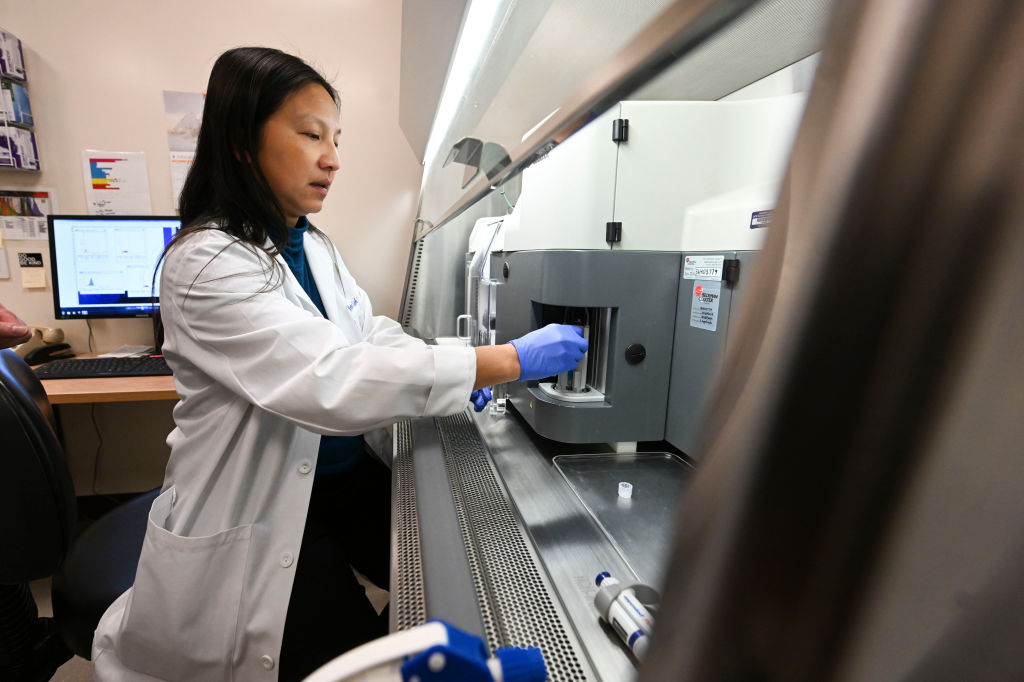Happy Wednesday! During a recent livestream on Instagram, Rep. Alexandria Ocasio-Cortez accused the Trump administration of attempting to “overwhelm” the public with a “constant” barrage of news developments. We’ll let today’s Quick Hits speak for themselves.
Quick Hits: Today’s Top Stories
- Marc Fogel, an American teacher who was arrested in 2021 and convicted in 2022 on politically motivated drug trafficking charges, was freed and returned to the United States on Tuesday after serving more than three years in Russian prison. The Pennsylvanian was formally declared “wrongfully detained” by the U.S. State Department in December following years of advocacy by his family members, who noted that his 14-year sentence—for the possession of a half-ounce of medical marijuana—was harsher than the typical punishment handed down to large-scale drug traffickers and violent offenders. The White House said Fogel’s release followed the negotiation of an “exchange” by special envoy Steve Witkoff and other administration officials, though details of the deal have not yet been made public.
- Israeli Prime Minister Benjamin Netanyahu said Tuesday that his country will resume fighting in the Gaza Strip if Hamas fails to release hostages by noon on Saturday. In the video address—which followed President Trump’s demand that the Palestinian terrorist group release all of the remaining abductees by this weekend—Netanyahu didn’t specify whether he was referring to all of the hostages or only those who had been previously slated for release this week before Hamas on Monday threatened to upend the ceasefire deal. Meanwhile, Jordan’s King Abdullah II said Tuesday that his country would accept 2,000 children from Gaza. The announcement, during an Oval Office meeting with Trump, followed the president’s recent call for the relocation of Palestinians from the war-torn enclave.
- Canadian Prime Minister Justin Trudeau on Tuesday announced plans to retaliate against President Donald Trump’s imposition of 25 percent tariffs on all steel and aluminum imports, with no exemptions for any country. Trudeau described the levies as “entirely unjustified,” but stopped short of outlining specific countermeasures. Speaking for the European Union, another U.S. trade partner affected by the move, European Commission President Ursula Von der Leyden also vowed that the “unjustified tariffs” would “trigger firm and proportionate countermeasures.” The sweeping duties are set to take effect on March 12.
- The United States and the United Kingdom on Tuesday declined to join 60 countries—including China, India, and France—in signing a joint declaration on artificial intelligence safety and regulation at a summit in Paris. The U.S.’s decision followed a speech by Vice President J.D. Vance at the gathering, during which he expressed concerns about an overly “risk-averse” approach to the emerging technology. The U.K., meanwhile, said that the statement—which pledges an “open,” “ethical,” and “inclusive” approach to AI development—failed to “sufficiently address harder questions around national security and the challenge AI poses to it.”
- President Trump issued an executive order Tuesday extending more power to Elon Musk’s Department of Government Efficiency, or “DOGE.” The directive gives DOGE oversight on hiring and requires federal agencies to work with the team to “eliminate waste, bloat, and insularity” through “large-scale” personnel reductions, consistent with applicable laws. Appearing alongside Trump in the Oval Office on Tuesday, Musk outlined his overhaul plan and vowed to eliminate alleged large-scale fraud within the federal government.
- Multiple outlets reported Tuesday that the Trump administration had moved to fire Paul Martin, the inspector general at the State Department and the Agency for International Development (USAID). Martin’s dismissal came a day after the watchdog’s release of a report detailing the negative repercussions of the administration’s efforts to pause USAID’s operations and drastically reduce its personnel. The overhaul “put more than $489 million of food assistance at ports, in transit, and in warehouses at risk of spoilage,” the inspector general found.
- Steve Bannon, onetime adviser to former President Trump, pleaded guilty Tuesday to defrauding donors to a fundraiser to build a southern border wall. Under the plea deal, Bannon will not face any jail time for the scheme, which raised more than $20 million from private donors. Last year, Bannon served four months in federal prison after being found guilty of contempt of Congress for refusing to cooperate with an investigation into the January 6, 2021, Capitol riot.
- President Donald Trump on Tuesday nominated Jonathan McKernan, a former board member of the Federal Deposit Insurance Corporation, to serve as director of the Consumer Financial Protection Bureau. The selection followed recent moves by the administration to halt the independent banking watchdog’s operations and fire its head, Biden appointee Rohit Chopra. Also on Tuesday, Trump nominated financial regulation attorney Jonathan Gould to serve as the comptroller of the currency. Both nominees are subject to Senate approval.
We can end smoking faster.

Research Funding Takes a Hit

What’s old is new again this week with President Donald Trump’s executive actions. The administration announced late last week a new cap that would cut billions of research cost funding provided by the National Institutes of Health (NIH) to universities and medical research institutions across the country. The move is nearly identical to a proposal made during the president’s first administration that was shot down by Congress.
With the aid of his DOGE hatchetman Elon Musk, Trump is again pursuing a cap, but this time, the administration is trying to do so without congressional approval. The move already faces a court challenge, and scholars and researchers who work with and study NIH grants argue that such a steep cut would take a sledgehammer to a vital medical research system that is in greater need of scalpel-level reforms.
The NIH announced Friday that effective Monday morning the agency would institute a 15 percent cap on so-called “indirect costs”—research overhead like facilities and administrative (F&A) expenses—across all NIH grants. “This change will save more than $4B a year effective immediately,” the agency said, arguing that universities with huge endowments like Harvard and Yale have excessive indirect cost rates for federal grants compared to grants from private foundations. Musk claimed ...
As a non-paying reader, you are receiving a truncated version of The Morning Dispatch. You can read our 1,791-word item on cuts to research funding in the members-only version of TMD.
Worth Your Time
- Move over, virtue signaling. There’s a new game in town: “vice signaling,” Thomas Chatterton Williams wrote in The Atlantic. “If a vogue for virtue signaling defined the 2010s and early 2020s, peaking in 2020 during the feverish summer of protest and pandemic—a period in which pronouns in bio, land acknowledgments, black squares, diversity statements, and countless other ethical performances became a form of social capital—something like the exact photonegative of that etiquette has set in now,” he wrote. “The reassertion of brute reactionary power in the dual ascendancy of Donald Trump and Elon Musk has brought us to a cultural tipping point. Virtue be damned: Now we are living in an era of relentless, unapologetic vice signaling.” The left’s relentless push to police social norms has produced an equal, and opposite, backlash, according to Williams: “We had a #MeToo movement characterized by sometimes disproportionate reputational sacrifices; now we have a presidential Cabinet populated by men with credible sexual-assault accusations on their records. The stifling racist/anti-racist binary of the anti-racism movement has led to the wholesale dismantling of DEI initiatives in both the government and the private sector. The insistence that ‘no human is illegal’ has ended with an unconstitutional attempt to retract birthright citizenship… On every single issue that mattered to them, progressives now find themselves in a weaker position than before.”
- The “fog of war”—the idea that active combat makes it almost impossible to accurately assess battlefield conditions—may have been made obsolete by the war in Ukraine, as technology makes it easier than ever before to observe the enemy. “Armies are having to work out how to fight on what is being called the transparent battlefield. The surveillance is layered. Orbiting satellites scan the Earth from space. Tactical drones have ranges of 200km or more. Smaller surveillance drones relay sightings to the operators of first-person view drones (FPVs), which carry a small munition to attack soldiers on the ground. Add a thermal-imaging camera and soldiers can also be spotted at night,” The Economist wrote. “Long-standing tactics have been upended. ‘One of the most obvious’, says Glib Voloskyi, an analyst for Come Back Alive, one of the largest volunteer [organizations] raising money to donate equipment to the Ukrainian armed forces, ‘is that it’s hard to achieve surprise.’ It is also almost impossible to achieve local force superiority: to gather and concentrate troops for an attack. The lethality of fire is greater because targets are easily identified, and artillery adjustments can be made quickly. The transparent battlefield gives the defender the advantage. ‘Offensive operations,’ says Mr Voloskyi, ‘are a really nasty business.’”
Presented Without Comment
CNN: The AP Says It Was Blocked From the Oval Office Over Continuing to Use ‘Gulf of Mexico’
Also Presented Without Comment
Reason: Donald Trump Goes to War Against Universally Hated Paper Straws
Also Also Presented Without Comment
Financial Times: Walt Disney Cuts Diversity Category From Executive Pay Scheme
In the Zeitgeist
The Westminster Kennel Club Dog Show was last night, and there were some very good boys in attendance. But it was ultimately Monty, a 5-year-old giant schnauzer, who beat out the competition to take home Best in Show.
Toeing the Company Line
- In the newsletters: Nick Cataggio wrote (🔒) about Donald Trump’s new spin on the “deep state.”
- On the podcasts: Chris Stirewalt takes over The Remnant to discuss the AI arms race, competition with China, and Trump’s plan to end the Ukraine war with American Enterprise Institute senior fellow Kori Schake.
- On the site: Kevin Williamson writes that American apathy may be Ukraine’s best option, David Drucker covers businesses’ efforts to secure exemptions from Trump’s tariffs, Charles Hilu reports on Lori Chavez-DeRemer’s bid to lead the Department of Labor, and Jonah Goldberg argues Trump’s whirlwind cycle of executive action will eventually slow down.











Please note that we at The Dispatch hold ourselves, our work, and our commenters to a higher standard than other places on the internet. We welcome comments that foster genuine debate or discussion—including comments critical of us or our work—but responses that include ad hominem attacks on fellow Dispatch members or are intended to stoke fear and anger may be moderated.
With your membership, you only have the ability to comment on The Morning Dispatch articles. Consider upgrading to join the conversation everywhere.